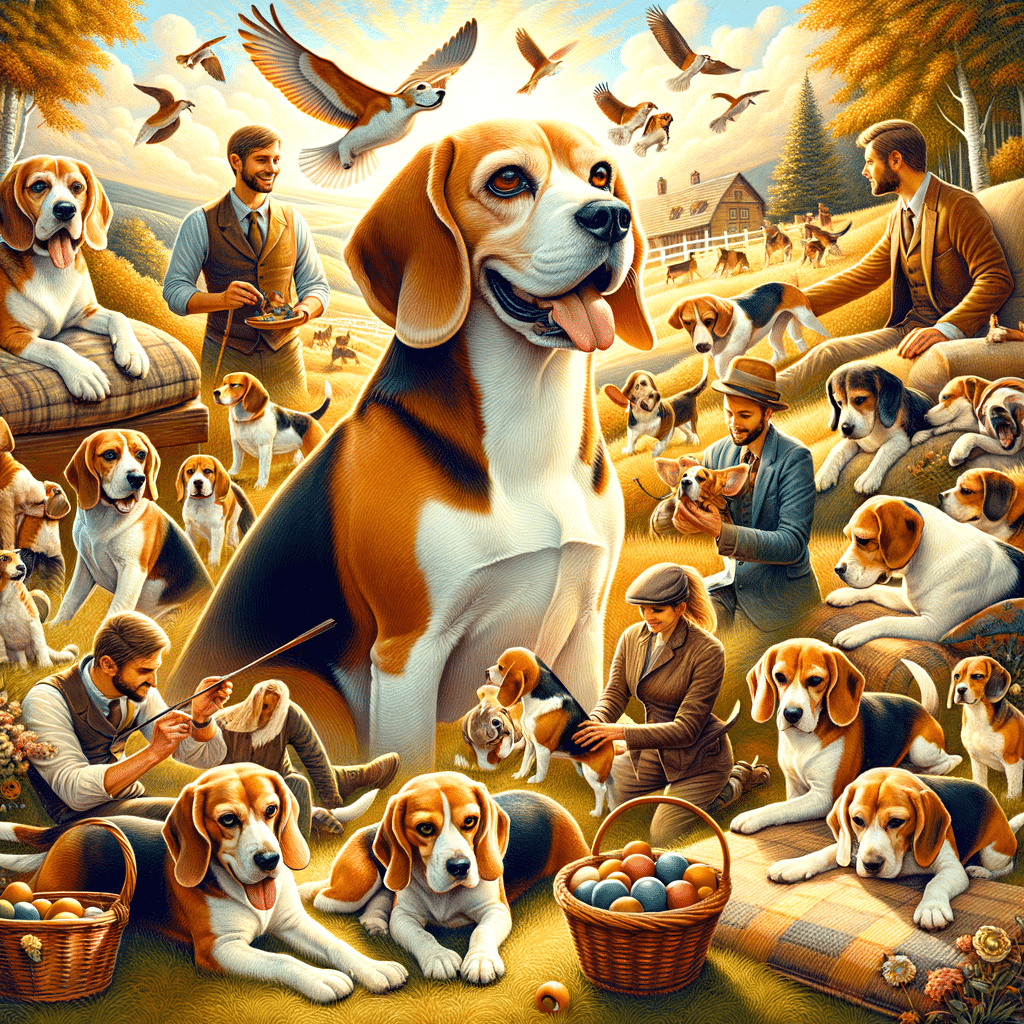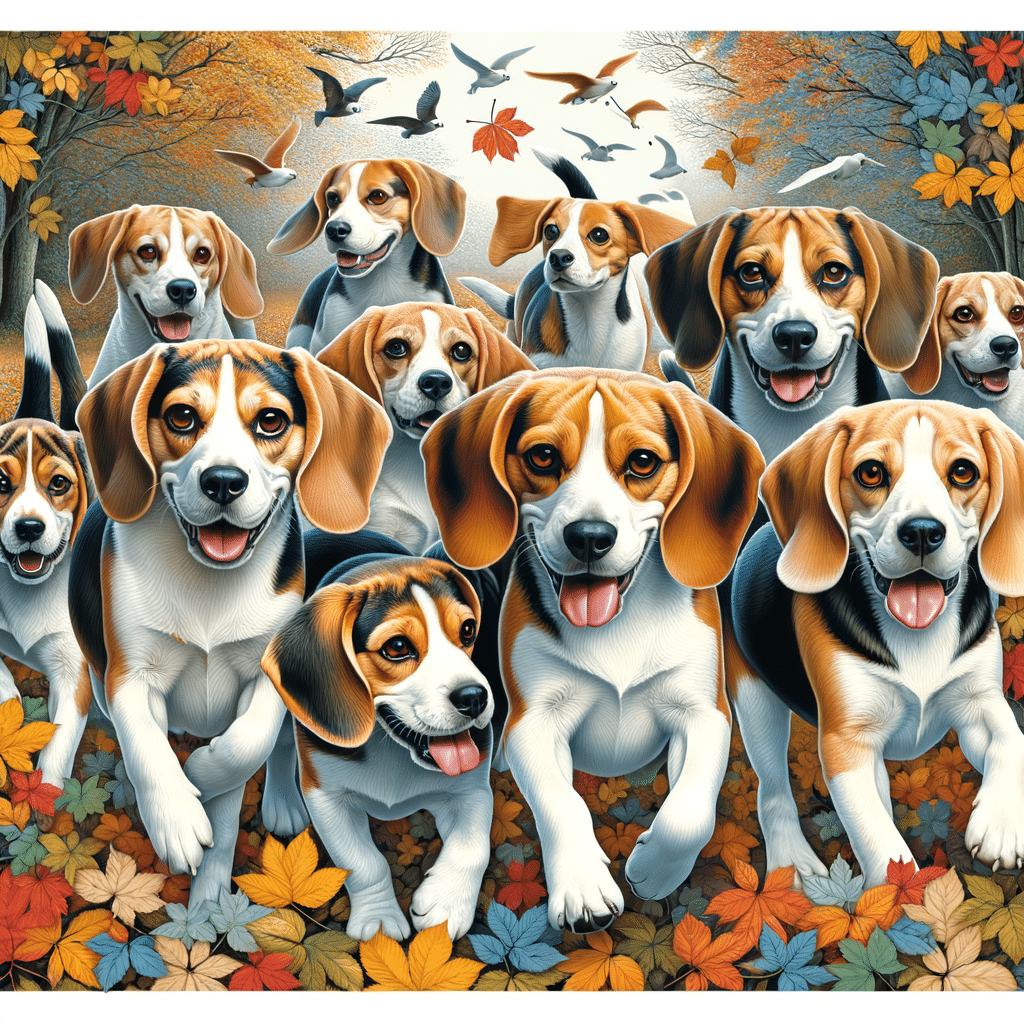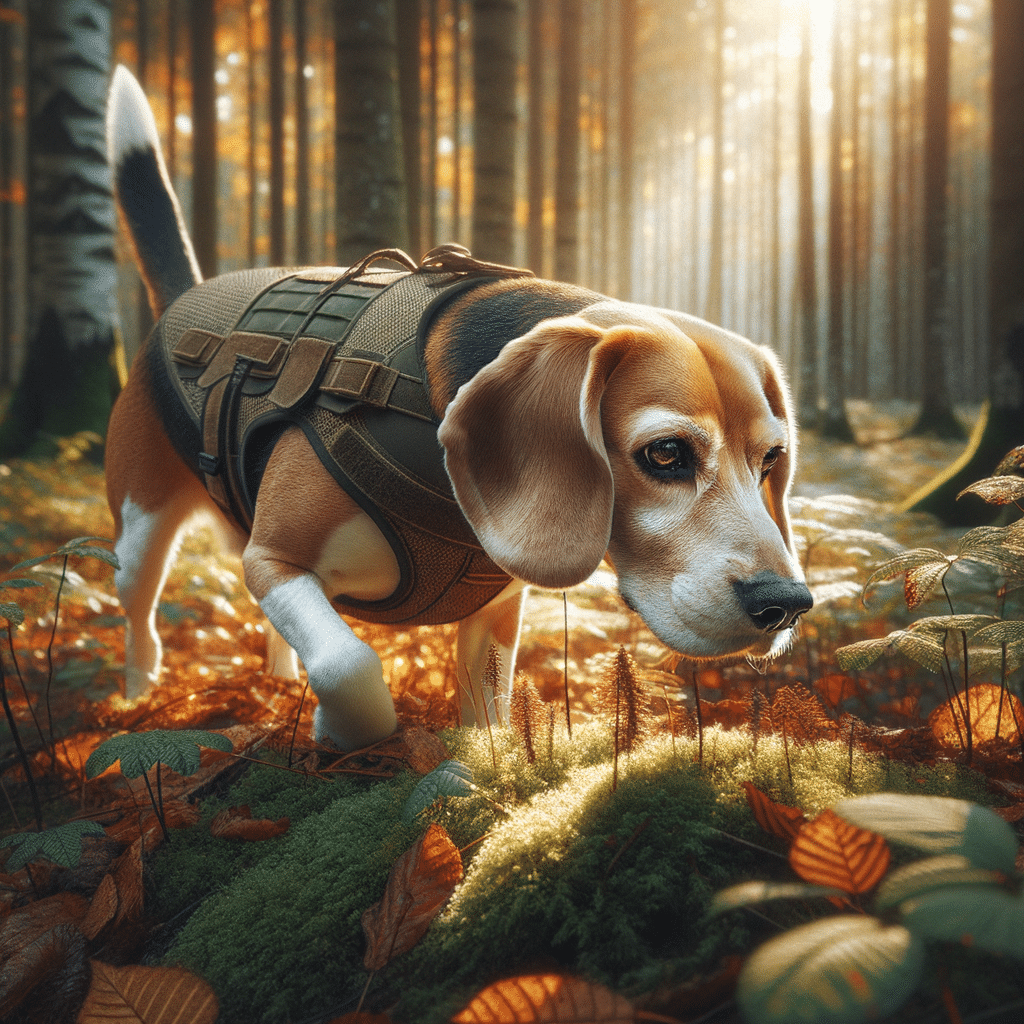Teacup beagles, a considerably smaller version of the traditional beagle, are popular for dog lovers seeking a compact companion. With their origins tracing back to the standard beagle, these diminutive dogs have charmed their way into the hearts and homes of many. Their size categorizes them within a range of toy and mini varieties, often weighing under 15 pounds. This tiny dog can be appealing for those living in smaller spaces or for families desiring a pet that embodies the beagle’s friendly and inquisitive nature in a smaller package.
In This Article
Developed with companionship in mind, teacup beagles require milder exercise than their larger counterparts, which suits less active owners or those with limited space for a pet to roam. Despite their compact stature, potential owners must understand that these dogs still possess the breed’s inherent traits, such as their keen sense of smell and friendly demeanor as scent hounds.
They come in classic tricolor and two-tone coats and maintain a sweet and gentle temperament typical of the dog breed. Moreover, teacup beagles are not officially recognized by major kennel clubs, which underscores prospective buyers’ need to select reputable sources that prioritize the health and welfare of these miniature hounds.
Highlights
- Teacup beagles offer the beagle’s friendly disposition in a smaller, more manageable size.
- Prospective owners should prioritize reputable breeders to ensure the health of their teacup beagle.
- Despite their small size, these dogs retain the friendly and inquisitive nature of the standard beagle.
Breed Overview
Teacup beagles epitomize a miniature variant of the traditional beagle breed. They have distinctive characteristics and an engaging temperament, making them ideal for dog enthusiasts seeking a smaller, companion-sized dog.
History and Origin
The teacup beagle, known alternatively as the miniature beagle, toy beagle, or Queen Elizabeth pocket beagle, descends from the standard beagle but is bred to be significantly smaller. Teacup beagles have contributed to the breed’s rich tapestry, with some associations with historical varieties like the Olde English pocket beagle. Despite their deep-rooted history, they remain a rare breed compared to their standard-sized counterparts.
Physical Characteristics
Size is the most distinct feature of teacup beagles, which stand approximately 9-12 inches tall and weigh 10-15 pounds. Their build results from dwarfism, specifically tailored to produce a tiny dog packed into a smaller frame with the beagle’s characteristics. Showcasing a range of colors, these miniatures maintain the beagle’s iconic floppy ears and expressive eyes.
Temperament and Personality
Teacup beagles exhibit a personality that mirrors the standard beagle: friendly, pleasant, and curious. Their playful and active nature makes them great companions. Their inherent pocket beagle makes them intelligent and loyal, but they can exhibit a stubborn streak. An informed approach to training can ensure your teacup beagle puppy will integrate well into your family life.
Health and Care
Due to their small size, teacup dogs like the teacup beagle require meticulous attention to their health and care needs. This tiny dog faces distinct health challenges and benefits from a tailored diet and a well-structured exercise regimen to maintain its well-being.
Common Health Issues
Teacup beagles may encounter specific health issues more frequently due to their miniature stature.
Key concerns for their dog care include:
- Intervertebral Disc Disease (IVDD): Their compact build makes them prone to back problems, where the cushioning discs between the vertebrae can bulge or herniate.
- Pulmonic Stenosis: A congenital heart defect that can be found in this breed where the blood flow from the right ventricle to the pulmonary artery is obstructed.
Monitoring their health and scheduling regular veterinary check-ups can help manage such conditions.
Diet and Nutrition
Proper feeding is paramount for a teacup beagle’s health. High-quality dog food, specifically formulated for small breeds, is recommended. Ensure the dry food is appropriate for their small mouths and dietary needs. Wet food can be given as an occasional treat or mixed with dry food for variety.
Avoid overfeeding, as this breed can easily become overweight, exacerbating potential health problems.
Exercise Requirements
Teacup beagles are active despite their size and have exercise needs that should be met. They require regular exercise to stay healthy and prevent boredom.
- Walks: Short walks 2-3 times per day.
- Playtime: Daily playtime can include physical activities such as tug or fetch and mental stimulation like training and scent work.
Indulge their hunting instinct with interactive play without encouraging overexertion. Exercise is essential for their physical health and mental well-being.
Buying and Adoption
When considering the addition of a teacup beagle to your family, the process involves careful consideration of the source and a clear understanding of the associated costs and expectations.
Choosing a Breeder
Selecting a reputable breeder is crucial when purchasing a teacup or pocket beagle puppy. Prospective owners should look for breeders who can provide detailed information about their puppies’ lineage, health, and care.
Reputable breeders often belong to established organizations like the Olde English Pocket Beagle Registry and have their kennels inspected by relevant authorities.
- Verify the breeder’s credentials and testimonials from previous clients.
- Confirm that the breeder conducts health checks and provides a history of the puppy.
- Ensure that the puppies are raised in a clean, loving environment.
Cost and What to Expect
The cost for miniature beagles can vary widely. Depending on the breeder’s reputation, location, and the purity of the breed, prices can range from $500 to $2,500. Adoption fees typically cover initial veterinary expenses like first rounds of vaccinations.
- Expect to pay more from breeders with a strong lineage and high-quality breeding practices.
- Beagle rescue organizations like Pocket Beagle Rescue may cost less, though there may be waiting lists for rescues from organizations like Pocket Beagle Rescue.
- Sometimes local rescue organizations and humane societies have beagles available, but you’ll need to keep a close eye on available dogs in your area.
Prospective beagle owners can find the right match for their family by performing due diligence and considering all breeder and adoption options.
Living With a Teacup Beagle
Teacup beagles are miniature versions of standard beagles, known for their friendly and affectionate nature, which make them well-suited companions for families, including those with children. However, their small stature requires specific considerations in training and daily care.
Training Challenges
Teacup beagles are intelligent but can be stubborn, making consistent training from an early age crucial. These tiny dogs can be easily distracted and may require more patience during training sessions. To prevent separation anxiety, which miniature beagles are prone to due to their social nature, it’s important to gradually acclimate them to being alone.
- Positive reinforcement: More effective than punitive measures, rewards-based training helps teacup beagles learn faster and strengthen your bond with them.
- Regular routine: Establishing a consistent schedule aids in a smooth training process.
- Early socialization: Exposing them to various environments and people prevents over-attachment to a single person.
Behavioral Traits
Living with a teacup beagle is an active endeavor. They are bubbly and outgoing, often displaying a playful spirit and boundless energy.
- With children: Miniature beagles are affectionate and typically good with kids, but as with any dog, interactions should be supervised.
- Active lifestyle: They require daily exercise to keep their lively tendencies in check and avoid destructive behavior from boredom.
- Vocalization: Beagles are known to be vocal, which can be managed with proper dog training and attention.
- Living Conditions: While adaptable, teacup beagles thrive in environments where they can explore and play, whether it’s a small apartment or a house with a yard, as long as their mental and physical needs are met.
Training and understanding the behavioral patterns of a teacup beagle contribute significantly to a harmonious life with these small yet spirited companions.
Frequently Asked Questions
This section provides detailed information on common inquiries about teacup beagles, their purchase, maintenance, and breed specifics.
How can I find reputable teacup beagle breeders?
To locate reputable teacup beagle breeders, one should research and select those who provide health clearances for puppy parents. It is also advisable to visit the breeding facility in person to observe conditions.
What is the price range for pocket beagle puppies?
Pocket beagle puppies typically cost between $500 and $1,500. Pricing will vary based on the breeder’s reputation, location, and the puppy’s lineage.
What are the adult size and weight expectations for teacup beagles?
Adult teacup beagles are generally expected to reach up to 12 inches in height and weigh between 7 to 15 pounds, though individual sizes may vary.
What is the average lifespan of a teacup beagle?
A teacup beagle’s average lifespan is typically around 12-15 years. Factors such as genetics, diet, and exercise significantly influence their longevity.
What should I consider before adopting a teacup beagle?
Before adopting a teacup beagle, consider the breed’s exercise requirements, potential health issues, and whether you have the time and resources to commit to its care.
Are pocket beagles recognized as an official breed by kennel clubs?
Pocket beagles are not recognized as a breed by major kennel clubs like the American Kennel Club (AKC). They are considered to be smaller versions of the standard beagle.






